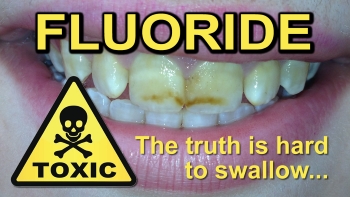
Fluoride may not be your teeth's best friend after all!
This short 2011 documentary looks at the initial theories behind the effectiveness of fluoride and where it originated. It goes on to show the lack of science behind the use of fluoride and reveals fluoride as a toxic waste substance that is being pumped into our drinking water.
The documentary concludes by delivering the “hard to swallow truth” of fluoride which pertains to why it is actually used.
Video link and alternative link
After watching this, you may want to avoid fluoride as much as possible. It's a good idea to find out from your water supplier if your water is fluoridated. In this case, you would need to use a filter that filters out fluoride or only consume spring/mineral water.
Then, you obviously need to look at your toothpaste. Fortunately, fluoride-free toothpastes are now widely available in health food shops or online. They are usually a bit more expensive than conventional toothpastes, but how valuable is our health after all? Make sure to watch out for other harmful ingredients, such as Triclosan, Sodium Lauryl Sulfate (SLS), Propylene Glycol, Titanium Dioxide or Diethanolamine (DEA)...
A cheaper (but still very effective) option, is to make your own toothpaste!
Here are two recipes for DIY toothpastes (there are many others on the internet):
Coconut Oil Toothpaste Recipe
Ingredients:
- Half cup of coconut oil
- 2 Tbsp. baking soda
- A few drops of essential oil of your choice (peppermint and/or myrrh oil recommended)
Method:
Melt the coconut oil (keep jar in hot water until melted), then add all other ingredients and mix well.
Put the mixture in a jar (you may keep it in the fridge for an hour to solidify) and apply on toothbrush to brush your teeth as needed.
Coconut oil contains antibacterial properties with healing components that go well with dental care. Baking soda helps in teeth whitening, removing plaque and cavity. So together, they make a perfect combination, even enhanced with the presence of essential oils which are anti-inflammatory with additional healing/soothing properties.
This recipe keeps well in a cool, dry place, for up to 3 months. In hot weather, you might need to keep it in the fridge to prevent the coconut oil from melting.
Clay Toothpaste Recipe
Ingredients:
- 1 ½ Tbsp bentonite/Montmorillonite clay
- 2 Tbsp distilled/filtered water
- 1 Tbsp coconut oil, melted
- ⅓ tsp sea salt (if you have soft enamel or sensitive teeth you may want to skip this or use less salt)
- 2 tsp baking soda (you could also add more in the summer if your coconut oil gets melty, but also add more water)
- 5-10 drops essential oils (eg. tea tree, clove, eucalyptus, thieves, frankincense, peppermint)
Method:
Mix water and clay to form a paste, then add all the other ingredients together.
Mix and put it in a glass/plastic jar or a toothpaste container-- do NOT let it get into contact with metal (wooden or plastic spoons are fine).
Clay absorbs toxins and removes them from your body. It's nature's detox agent. It enhances gum repair and prevents cavities by remineralizing the teeth.
This recipe will also last for months at room temperature.
Recipe 1 source: https://righthomeremedies.com/homemade-coconut-oil-toothpaste-recipe-benefits/
Recipe 2 source: http://www.overthrowmartha.com/2014/02/diy-toothpaste-with-baking-soda-clay.html
